

What stress is to working adults? What is Stress? - The American Institute of Stress. Stress is not a useful term for scientists because it is such a highly subjective phenomenon that it defies definition.

And if you can’t define stress, how can you possibly measure it? The term “stress”, as it is currently used was coined by Hans Selye in 1936, who defined it as “the non-specific response of the body to any demand for change”. Selye had noted in numerous experiments that laboratory animals subjected to acute but different noxious physical and emotional stimuli (blaring light, deafening noise, extremes of heat or cold, perpetual frustration) all exhibited the same pathologic changes of stomach ulcerations, shrinkage of lymphoid tissue and enlargement of the adrenals. He later demonstrated that persistent stress could cause these animals to develop various diseases similar to those seen in humans, such as heart attacks, stroke, kidney disease and rheumatoid arthritis.
At the time, it was believed that most diseases were caused by specific but different pathogens. 5 Things You Should Know About Stress. How Does It Affect My Body? Definition of stress by Medical dictionary. Definition Stress is defined as an organism's total response to environmental demands or pressures.
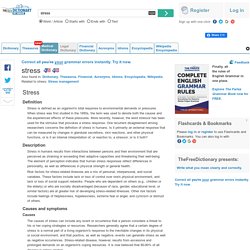
When stress was first studied in the 1950s, the term was used to denote both the causes and the experienced effects of these pressures. More recently, however, the word stressor has been used for the stimulus that provokes a stress response. One recurrent disagreement among researchers concerns the definition of stress in humans. Introduction to Psychology. Learning Objectives By the end of this section, you will be able to: Differentiate between stimulus-based and response-based definitions of stressDefine stress as a processDifferentiate between good stress and bad stressDescribe the early contributions of Walter Cannon and Hans Selye to the stress research fieldUnderstand the physiological basis of stress and describe the general adaptation syndrome The term stress as it relates to the human condition first emerged in scientific literature in the 1930s, but it did not enter the popular vernacular until the 1970s (Lyon, 2012).
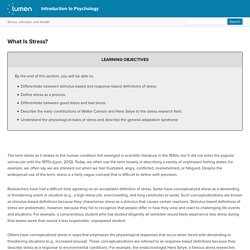
Today, we often use the term loosely in describing a variety of unpleasant feeling states; for example, we often say we are stressed out when we feel frustrated, angry, conflicted, overwhelmed, or fatigued. Despite the widespread use of the term, stress is a fairly vague concept that is difficult to define with precision. Researchers have had a difficult time agreeing on an acceptable definition of stress.
Summary 1. 10 Practical Ways to Handle Stress. Stress is inevitable.
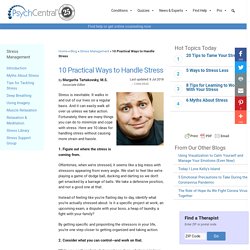
It walks in and out of our lives on a regular basis. And it can easily walk all over us unless we take action. Fortunately, there are many things you can do to minimize and cope with stress. Here are 10 ideas for handling stress without causing more strain and hassle. 1. Oftentimes, when we’re stressed, it seems like a big mess with stressors appearing from every angle. Instead of feeling like you’re flailing day to day, identify what you’re actually stressed about. By getting specific and pinpointing the stressors in your life, you’re one step closer to getting organized and taking action. 2.
11 Strategies for Managing Stress. The root of stress management is realizing stress is information that we can examine and use, and the first step in understanding that data is becoming mindful of our stress and its impact upon us, says Kathleen Hall, founder of The Stress Institute in Atlanta.

While the subtleties may vary in stress management sources’ tips on how to manage stress, there are a number of constants. The following covers some of the universal ground, and a few wild cards. Related: 23 Questions to Ask Yourself When You’re Stressed Out 1. If you can’t avoid a stressful situation, try to alter it. Often, this involves changing the way you communicate and operate in your daily life. 2. Reframe problems. 3. Even 20 minutes of self-care is helpful. It may seem difficult to get away from a big work project, a crying baby, or a growing credit card bill, but when you give yourself permission to step away from it you can gain a new perspective and feel less overwhelmed. 4. Positive thinking: Reduce stress by eliminating negative self-talk. Positive thinking: Stop negative self-talk to reduce stress Positive thinking helps with stress management and can even improve your health.
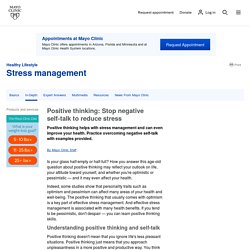
Practice overcoming negative self-talk with examples provided. By Mayo Clinic Staff Is your glass half-empty or half-full? How you answer this age-old question about positive thinking may reflect your outlook on life, your attitude toward yourself, and whether you're optimistic or pessimistic — and it may even affect your health. Indeed, some studies show that personality traits such as optimism and pessimism can affect many areas of your health and well-being. Understanding positive thinking and self-talk Positive thinking doesn't mean that you keep your head in the sand and ignore life's less pleasant situations. Positive thinking often starts with self-talk.
If the thoughts that run through your head are mostly negative, your outlook on life is more likely pessimistic. The health benefits of positive thinking Identifying negative thinking Filtering. Work force stress and positive coping strategies. Dr Jo Gilmartin, People Systems and Services (PSS) Research Group, School of Healthcare, University of Leeds, J.Gilmartin@leeds.ac.uk Contemporary academia has recently been reported as one of the most stressful professions in the United Kingdom; not the dreaming spires of academia; a life of reflection, unpacking concepts, writing papers, sunny afternoons punting on the river, or ‘Educating Rita’.
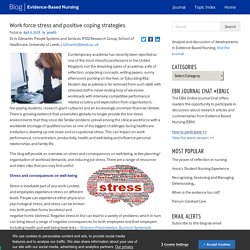
Modern day academia is far removed from such idylls with stressed staff in never ending loop of excessive workloads with intensely competitive performance related scrutiny and expectation from organisations, fee-paying students, research grant cutbacks and an increasingly uncertain financial climate. There is growing evidence that universities globally no longer provide the low stress environments that they once did. Methods of coping with stress at work: A conceptual analysis and empirical study of measurement issues - Dewe - 1990 - Journal of Organizational Behavior. Aging and Stress. By Chris Woolston, M.S.

At any age, stress is a part of life. Young and old alike have to face difficult situations and overcome obstacles. While young adults struggle to establish a career, achieve financial security, or juggle work and family demands, older people may face failing health or dwindling finances -- or simply the challenges of retaining their independence. Unfortunately, the body's natural defenses against stress gradually break down with age. But you don't have to give in to stress just because you're no longer young. Many seniors still manage to sail through their later years. OLDER ADULTS’ COPING WITH NEGATIVE LIFE EVENTS: COMMON PROCESSES OF MANAGING HEALTH, INTERPERSONAL, AND FINANCIAL/WORK STRESSORS. Coping, stress, and social resources among adults with unipolar depression. - PubMed - NCBI.
Coping with and Managing Stress.